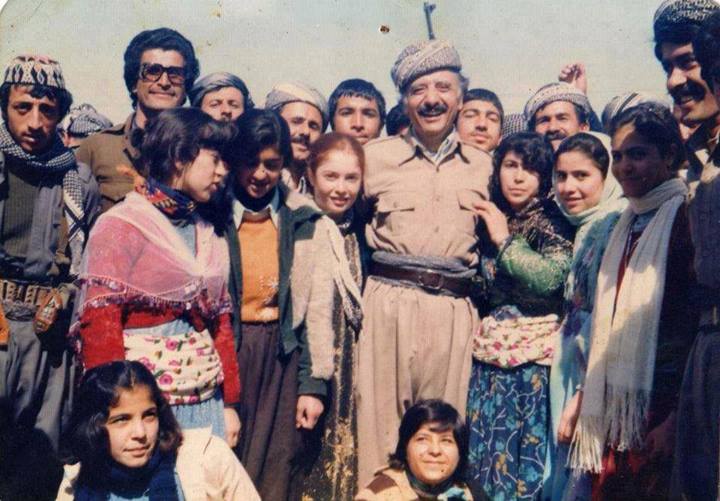23 years ago today, on the 13 July 1989, a legendary Kurdish leader, to many Kurds and associates, was assassinated by the Islamic republic of Iran. The killing did not occur on Iranian soil, the killing occurred in an apartment on the outskirts of Austria, in Vienna. Dr Abdul Rahman Ghassemlou and two of his associates, one of them being Abdullah Ghaderi, were assassinated, in Europe, by terrorist sent by the Islamic republic of Iran, where they were holding secret talks with envoys sent by then Iranian president Akbar Hashemi Rafsanjani.
Dr Ghassemlou was born on the 22nd of December 1930 in Urmieh, Kurdistan. He was a very bright student he completed studies at the University of Paris and then later in Czechoslovakia. Dr Ghassemlou had a Doctorate in economics and was an associate professor in his field. He married Helen Krulich who he met in Czechoslovakia and they had two beautiful daughters together, Mina (1953) and Hewa (1955). Dr Ghassemlou has many attributes but his finest was his fluency in 11 different languages including his mother-tongue. He spoke both Kurmanci and Sorani dialects of Kurdish and also knew Persian, Arabic, Turkish, Azerbaijani, French, English, Russian, Czech, Solvack and German.
In 1973 he was elected and became the secretary-general of Democratic Party of Iranian Kurdistan (PDKI), a position which he was reelected for several times up until his death in 1989. Regardless of which party he represented or the fact that he was not without flaws, he was and still is a legendary and very well respected Kurdish leader among Kurds everywhere, especially in Rojhelat, East Kurdistan.
In 1979 his party supported the revolution in Iran to end the reign of Mohammad Reza Shah Pahlavi but the party boycotted the referendum for the new constitution. This gave rise to tensions between the Kurdish parties and the new regime. A Kurdish armed rebellion began and Ayatollah Khomeini declared a holy war against Kurdistan. Thousands of executions and massacres of Kurds in East Kurdistan began continuing right up until today, were we are seeing mass executions of ‘political prisoners’.
At the end of the Iran-Iraq war the Iranian government started to hold negations with the Kurds. Meetings with Dr Ghassemlou and his party were carried out in Europe. The delegations sent on all occasions from Tehran were Mohammed Jafar Sahraroudi and Hadji Moustafawi. For the meeting on July 13 a third man also accompanied the three delegates from Tehran Amir Mansur Bozorgian who acted as a bodyguard. Dr Ghassemlou, his aide Abdullah Ghaderi-Azar (member of the PDKI Central Committee) and Fadhil Rassoul, an Iraqi university professor who had acted as a mediator attended the meeting were they were all shot to death.
Dr Ghassemlou was killed by 3 bullets at a very short range, Mr Ghaderi-Azar was shot 11 times and Mr Rassoul 5 times. The three diplomat-terrorists of the Islamic regime escaped unharmed and immediately took refuge in the Iranian embassy. In spite of credible evidence on the direct involvement of dispatched diplomat-terrorists of the Islamic regime in the assassination of a very well known Kurdish political party leader, the government of Austria traded the justice of three lives of their own citizens for their country’s political and commercial interests and allowed the terrorists who had taken refuge in the Iranian embassy after the killings to slip out of Austria without any charges, consequences or ever being questioned by the Austrian authorities. This unjust decision by Austria and the European representatives led Iran to think they could, with absolutely no consequences, continue to kill Kurdish leaders no matter where they resided in the world and true to their terrorists state the Islamic Republic of Iran then went on to assassinated Dr Saied Sharafkandi in Berlin Germany in 1992 in the infamous Mykonos restaurant assassinations. This time Europe finally woke up to the injustice being committed against the Kurds in the world and sentenced the perpetrators to life imprisonment. In 2004 Mahmoud Ahmadinejad, the mayor of Tehran at the time, wrote a letter to Mr. Klaus Wowereit, Mayor of Berlin, to object to the commemoration of a plaque in front of the restaurant for the Kurdish leaders assassinated by the regime calling it “An insult to Iran.”
In a book recently published about Dr Ghassemlou, ‘The Passion and Death of Rahman the Kurd: Dreaming Kurdistan’ by Carol Prunhuber, she describes Dr Ghassemlou as a man whose…
“Lifelong wish was that of lasting peace for his people. He was the visionary and cultivated leader of the Iranian Kurdish revolutionary movement, brutally assassinated in 1989 while negotiating a peace accord for his people with Iran’s government emissaries in Vienna. His light still shines upon the volatile politics of this remote Middle East region that continues to play prominently upon the worlds political stage.”
Although he has his criticisers, to many in Kurdistan Dr Abdul Rahman Ghassemlou is the ‘Serok Apo’ of Rojhelat. Justice for the death of Dr Ghassemlou is yet to be served, since his trail was dismissed the Kurds in Europe have tried to get the case reopened but failed. The terrorists who committed this crime must be brought to justice and the terrorist regime of the Islamic republic of Iran must be held accountable. 23 years later this justice still lies in the hands of Europe and the Austrian government. I will leave you with a famous quote of his and one of my all time favorites:
“We are Kurds, we belong to a people that the vicissitudes of history have scattered over five states. A bond of brotherhood binds us, and will continue to bind us, to all other Kurds, wherever they live.” – Dr Abdul Rahman Ghassemlou
May he rest in peace.


